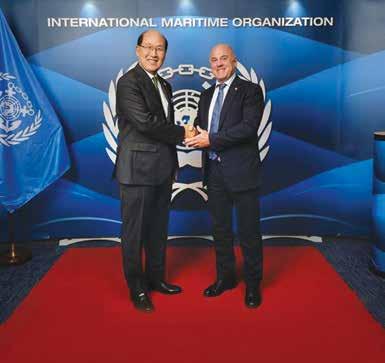
Brazilian Maritime Pilots' Association Magazine 66th edition - October/2023 to January/2024


Brazilian Maritime Pilots' Association Magazine 66th edition - October/2023 to January/2024
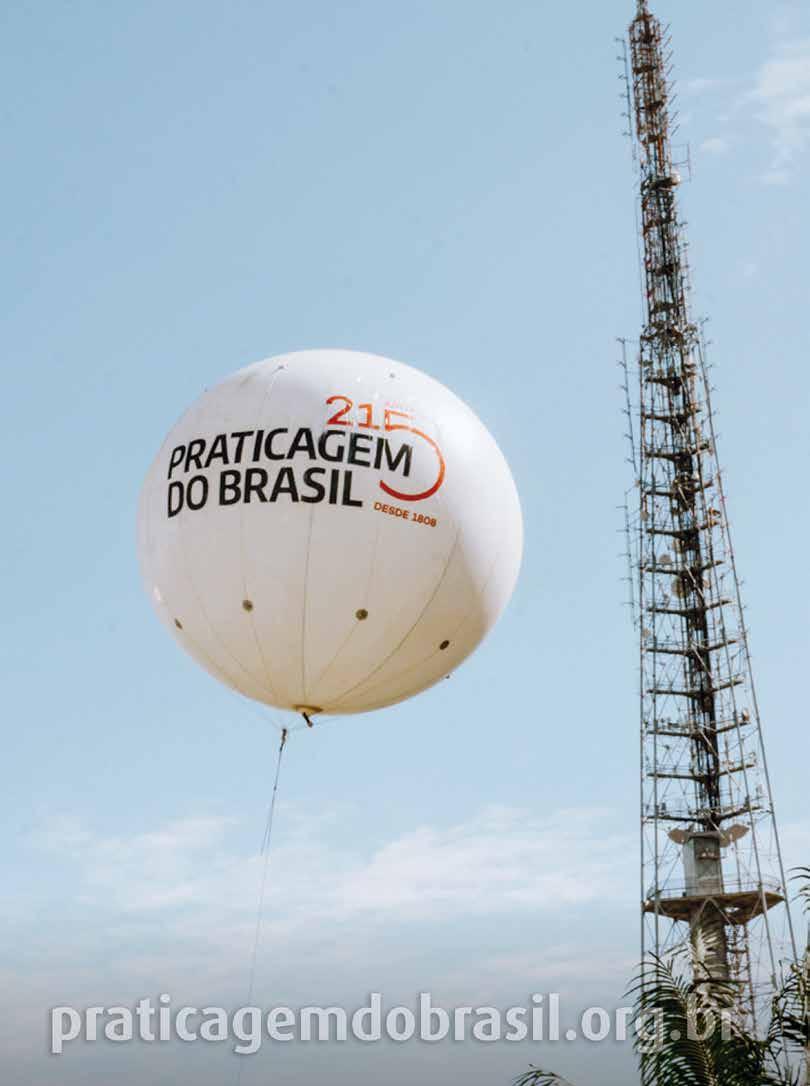

Dear readers, in this edition we take a pause in the series on the pilotage zones for a special report.
We describe in detail the International Brazilian Pilots Seminar – International conventions, accidents and their consequences. With this event held in Brasilia, we highlight the large-ship accident-response conventions of which Brazil is not a signatory. Without these signed instruments, the country has access to few resources for removal of debris and against pollution, which may impact the life of people, the economy and environment for years.
The event was part of the program of the 45th National Pilotage Meeting, which on the first day addressed the technical partnerships of Brazilian Pilots from the oldest – with São Paulo University – to the most recent – with Navigandi, Technomar and Senai Cimatec. In the following text, the reader can check out how the day went in the Brazilian Pilotage Institute.
On that date in the same venue, the pilots, meeting in an assembly, elected the new Brazilian Pilots board for the 2024-2025 two-year period. Pilot Bruno Fonseca, from Ceará, took over the presidency from pilot Ricardo Falcão, from the Eastern Amazon Basin, who continues on the board. Bruno Fonseca addresses the main challenges of his management in one of the reports.
We also discuss the first group of the Pilots’ Refresher Course (ATPR) in Brasilia. For the first time, the classroom part was held in the Brazilian Pilotage Institute, which adds to the teaching units of the Rio de Janeiro Navy (Ciaga) and Belém (Ciaba). The Brazilian program is mandatory every five years and an international benchmark. On the course, three pilots reported their experiences in accidents during the motorboat/ship transfer. We transcribe their lessons to help contribute toward everyone’s safety.
Further good news from Brasilia was the sanction of the new law that upgrades the regulation of pilotage in Brazil, after widespread discussion in Congress.
Lastly, we close the edition with a noble cause. During the international seminar, we finalized an auction in favor of the Médecins Sans Frontières organization. The procured painting regarding pilotage by artist Bruno Big will help feed 537 malnourished children for one month. Let's all show more solidarity in 2024!
Av. Rio Branco, 89/1502 – Centro – Rio de Janeiro – RJ – CEP 20040-004
Tel.: 55 (21) 2516-4479
conapra@conapra.org.br praticagemdobrasil.org.br
director president of Brazilian Maritime Pilots' Association
Bruno Fonseca de Oliveira
director vice-president Marcello Rodrigues Camarinha
directors
Felipe Perrotta Bezerra
Jelmires José Galindo Junior
Ricardo Augusto Leite Falcão (vice-president of IMPA)
Rumos Práticos
planning
Otavio Fragoso/Flávia Pires/Katia Piranda
editor
Otavio Fragoso
writer
Rodrigo March (journalist in charge)
MTb/RJ 23.386
translation
Elvyn Marshall
revision
Julia Grillo
layout and design
Katia Piranda
pre-print
DVZ Impressões Gráficas
cover photo: Pedro Ladeira e Paula Carrubba
The information and opinions expressed in this publication are the sole responsibility of the authors and do not necessarily express the Brazilian Maritime Pilots' Association viewpoint.

Seminar supports approval of conventions in response to major accidents
Technical partnerships are a highlight at the 45th National Pilotage Meeting
Brazilian Pilotage Institute welcomes the class of the ATPR Course
“We must not cut costs in life-saving equipment”
“I started wearing a helmet after the incident”
“A good lee is essential”
Pilot Bruno Fonseca, from Ceará, now president of the Brazilian Maritime Pilots' Association
President of the Republic sanctions new pilotage act
Art auctions on behalf of the humanitarian organization
Médecins Sans Frontières/ Doctors Without Borders (MSF)
Paper-free Rumos Práticos now uses even less paper consumption





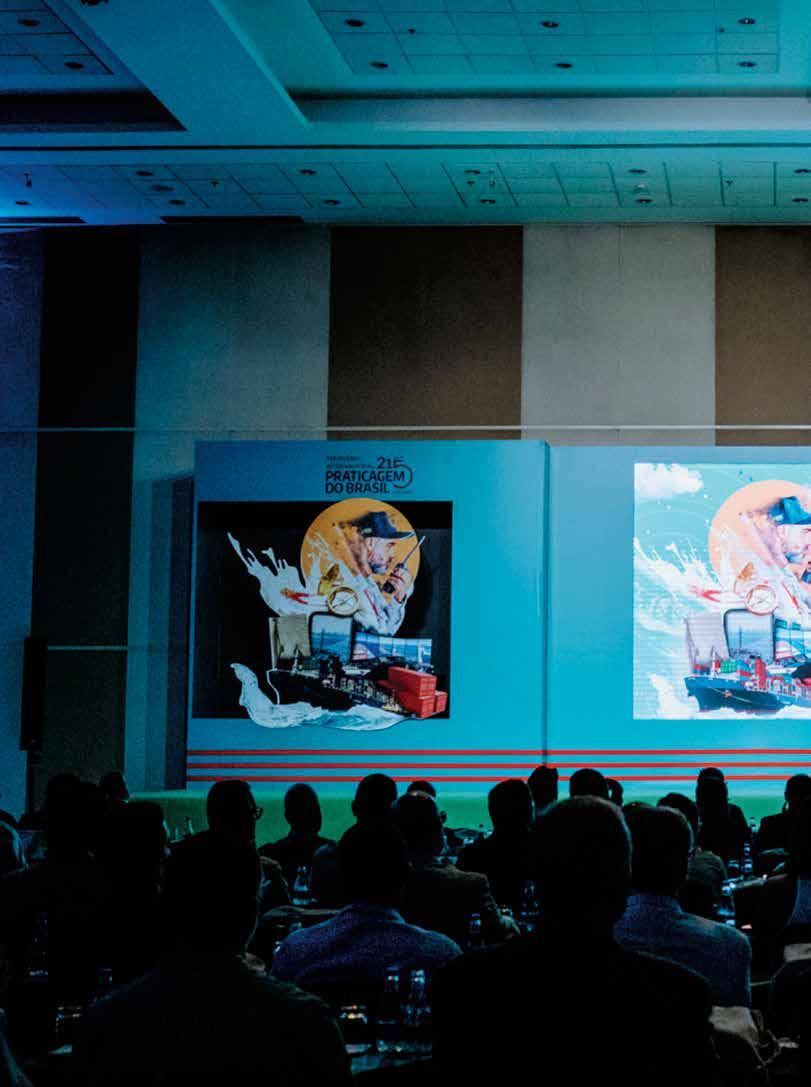
In this special report, we highlight the Brazilian International Pilotage Seminar – International Conventions, accidents and their consequences, held on December 6, 2023, in Brasilia. The event called attention to the conventions in response to accidents with large ships to which Brazil is not a signatory. These instruments guarantee agility and resources to remove shipwrecks and combat pollution. Brazil signed one of them, being entitled to USD 8.9 million in the event of an accident only with an oil tanker. The sum does not even cover the fine of the Brazilian Institute of Environment and Renewable Natural Resources (Ibama).
The regime signed by the country was the International Convention on Civil Liability for Oil Pollution Damage (CLC), in 1969, created after the accident with the oil tanker Torrey Canyon two years earlier off the UK coast. The vessel was carrying 119,328 tons of crude oil. It was the first major disaster involving an oil tanker.
“Until then, the international conventions were focused on prevention, there were no response mechanisms and discussion regarding liabilities on repairing damage”, recalled Iwam Jaeger, partner in Kincaid Mendes Vianna Advogados.


AROUND 200 GUESTS AT EVENT IN BRASILIA
Brazil incorporated the CLC-69 but did not adhere to the 1992 CLC and complementary compensation funds, applied when compensation limits were extrapolated. Only five States party to the CLC-69 did not join the CLC-92: Brazil, Kazakhstan, Equatorial Guinea, Libya and Sao Tomé and Príncipe.
After CLC-92, the compensation limits increased 641%. Moreover, the convention is also applicable to an oil tanker’s bunker fuel spill and to the exclusive economic zone, where all exploration and production oil fields are in Brazil. Now CLC-69 applies only to oil as cargo and to territorial waters (12 nautical miles from the continent).
“In 2019, the CLC would have ensured immediate access to more than one billion US dollars to pay for the expenses of the oil spill pollution on the shores of Northeast Brazil”, emphasized pilot Ricardo Falcão, then president of Brazil Pilots and vice-president of the International Marine Pilots’ Association (IMPA).



“If we really wish Brazil to adopt the international paradigms, we will need to urgently sign the relevant conventions”, argued Iwam Jaeger.
The resources to cover damage come from compulsory insurance on oil tankers of the signatory countries and the International Group of Protection and Indemnity (P&I) Clubs (international mutual insurance associations for oil tanker owners). So, the ones who contribute are the companies, not the States. According to the director of Britannia P&I, Michaela Domijan-Arneri, 90% of the tankers are aligned with the conventions.
The adoption of the CLC-92 passes through the Federal Senate for approval and later confirmation from the President of the Republic. In November 2022, the Senate received favorable opinions for signing from the Ministers of Foreign Affairs, Defense, Economy and the Environment.
“The ratification of the 1992 CLC, the 1992 funds and potentially the supplementary fund is favorable to create a legal security, as well as potential practical security not only in case of demarcation, but also in unblocking sources of alternative funds in the event of an incident of this kind”, maintained Michaela Domijan-Arneri.

Three other important conventions, of which Brazil is not a signatory, were discussed during the seminar. To deal with pollution from other products, such as chemicals, acid, liquified gases and fertilizers, there was the International Convention on Liability and Compensation for Damage in Connection with the Carriage of Hazardous and Noxious Substances by Sea, (HNS), in 1996. The topic was addressed by Jan de Boer, the senior legal assistant of the International Maritime Organization (IMO).
In 2001, there was the International Convention on Civil Liability for Oil Pollution Damage caused by Bunker Pollution. It applies to the oil spill of any kind of ship, except tankers, target of the CLC.
To fill the gap in relation to the vessel’s remains the International Convention on Removal of Shipwrecks (Nairobi Convention) was adopted in 2007. The purpose was to accelerate the removal of wrecks since a vessel that sinks can become a shipping and environmental hazard. In practice, this Convention also makes the shipowners liable and provides the legal bases for the countries to remove the wrecks.
Jan de Boer (IMO) mentioned the case of the tanker Texaco Caribbean, which was hit by a cargo ship and sank, in 1971. Despite signage of the accident, the next day a ship collided with the wreck and also sank. And even with the reinforced signage, that same month another vessel collided with what remained of the Texaco Caribbean, having the same fate. A total of 51 people died. The removal of the three ships took 18 months.
In Brazil, the most recent case was that of the ship Haidar in 2015. To date, the vessel has not been removed from the bottom of the Pará riverbed. The shipwreck with a live cargo of cattle caused serious health, social and environmental impacts for the riverside population.


Another iconic case addressed during the seminar, in relation to environmental pollution, was the Exxon Valdez, in Alaska in 1989. To navigate in a region at the time of optional pilotage, the pilot was not requisitioned. The vessel went aground, bursting eight cargo tanks and spilling 38,000 tons of crude oil. Although it was the world’s 35th accident in terms of spilled volume, this was the one that caused most damage to an ecosystem, according to Marcus Lisbôa, consultant to the Regional Association of Oil, Gas and Biofuels Sector Companies in Latin America and the Caribbean (Arpel):
“In a few days, the oil spread 2,200 kilometers, the distance between Rio de Janeiro (RJ) and Natal (Rio Grande do Norte-RN). The clean-up cost was equivalent to procuring 40 new ships. Ten years later there are still remains from the pollution."

The accident claim led to the Oil Pollution Act (OPA-90) – a US accountability system – and to the rise of a double hull in ships, designed to prevent damage to the tanks.
From 1970 to 2023, the International Tanker Owners Federation for Pollution Limited (Itopf) worked on more than 850 incidents in 100 countries, an average of 15 spills a year. The not-for-profit organization was created in 1968 shortly after the accident with the Torrey Canyon, to manage a compensation fund for the victims. Today, it provides technical advice and support regarding spills, being funded by the global maritime industry. Itopf provides instructions about the admissibility of compensation claims.
“All claims must be sustained on facts and support documentation, always seeking prior advice from P&I specialists funds and Itopf. If everyone is on the same page, everything moves faster”, explained Duarte Soares, technical consultant for the institution, giving an example. “Only one ship from South Korea, with a 12,000-ton spill, caused 128,000 claims. The pay-out was almost GBP 280 million."
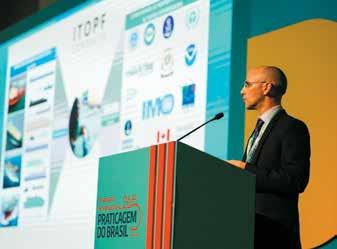
The Brazil Pilots’ president stressed that there is no coastal country that can guarantee no major accident in its waters:
“The international community has developed several instruments to help us deal with such situations. We cannot receive USD 8.9 million while the same accident compensates USD 300 million in Argentina and one billion US dollars in French Guinea. Here’s to the continuation of the debate in the Legislative, with the support of such entities as the Brazilian Navy and Antaq (National Waterway Transport Agency).”
Jan de Boer added, “I hope that this seminar has a significant impact on the ratification progress, implementation and execution of all relevant IMO instruments on liabilities and compensation in Brazil”.

The International Seminar on Pilotage in Brazil included more topics on the agenda. Pilot Miguel Castro, senior vice-president of the European Maritime Pilots’ Association (EMPA), presented the institution and how the pilotage system operates on the European continent, without competition between pilots:
“In Europe, we had two countries where the competition didn’t work well. In Romania, they created four companies in 2017. Most of the pilots had no kind of training, were retirees or captains on vacation. The theory was the more pilots there are the better. But equipment was scarce, and prices would triple, because it was necessary to quadruple investments in operation centers, motorboats and training. In 2022, the country retreated. In Denmark, that same year, a parliament report stated that the competition brought no benefit. On the contrary, there was a 9% drop in efficiency since 2013.
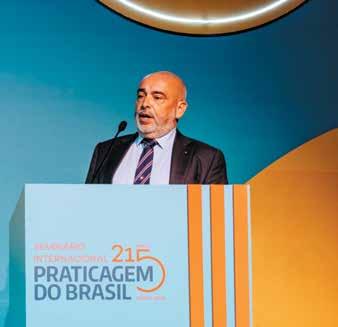
Antaq director, Alber Furtado, in turn, addressed the structure and role of the agency, responsible for regulating the waterway transportation services and operation of the port and waterway infrastructure. He said that in Brazil there are 226 terminals of private use (TUPs), 35 public ports and 144 leased terminals within these ports. Moreover, Antaq regulates and authorizes 1,200 Brazilian shipping companies.
Since 2007, the agency represents Brazil in the World Association for Waterborne Transport Infrastructure (Pianc). In 2023, Antaq backed the creation of Pianc’s national section. Its vice-president for the Americas, Calvin Creech, described what the association
does and how to produce the technical reports to guide port planning.
Alexandre Dal Fior, head of Antaq International Consultancy Relations, said that, after the institution of the national section, the Brazilian members can participate in the committees responsible for drafting international guidelines for Pianc, bringing the country's perspective. The Brazilian Pilots’ Association is one of the members of the section.

The international seminar was part of the 45th National Pilots’ Meeting, and was attended by representatives of the Executive, Legislative and Judiciary. Among them were senator Lucas Barreto (Amapá-AP); members of parliament Luiz Carlos Hauly (Paraná-PR), Coronel Meira (Pernambuco-PE) and Augusto Coutinho (Pernambuco-PE) the latter attending online; Morgana de Almeida, minister of the Labor Supreme Court (TST); and Marcelo de Amorim, coordinator for Ibama Environmental Attendance and Emergencies.
11 international events


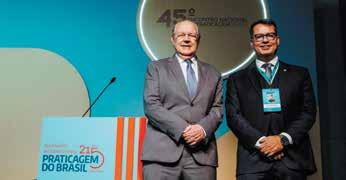








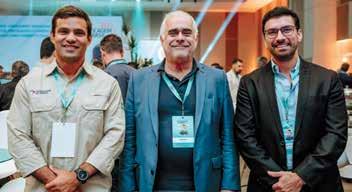






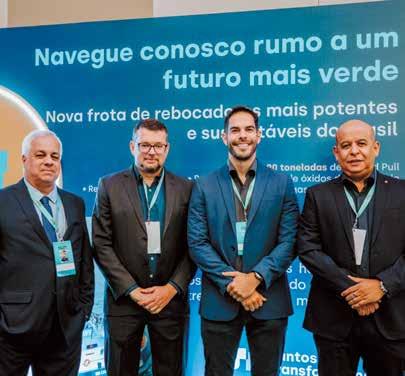

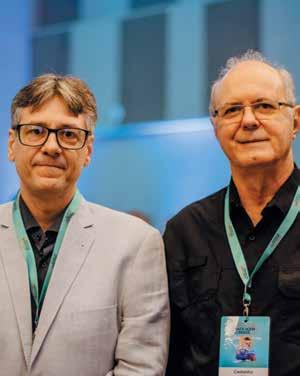


The 45th National Pilots’ Meeting was held in Brasilia on the 5th and 6th of December 2023, in the presence of almost a hundred pilots, managers and advisers of pilotage companies. The second day was devoted to the Brazilian International Pilots’ Seminar –International Conventions, accidents and their consequences –addressed in the special edition of this magazine. The first day offered the in-house program, involving meetings and introduction of pilotage technical partners.
On the morning of the 5th, at the Brazil 21 Conventions Center, the managers and advisers of the companies met to discuss the amendments to the Maritime Authority Standards for Pilotage Services (NORMAM-311/DPC) and tax issues. The meeting was conducted by Arionor Souza, executive secretary of Conapra.
In the afternoon, they gathered with the pilots to meet the Brazilian Pilotage Institute and its maneuver simulation center, with two full-mission simulators. At the site, old and new pilot partnerships were introduced.
The then president of Brazilian Pilots’ Association, pilot Ricardo Falcão, opened the event and took the opportunity to say goodbye to his colleagues. He was substituted in January by the vicepresident pilot Bruno Fonseca, elected at a general meeting at the end of day, as our readers will see in the following article.
“I spent eight years as president, four terms. Today is a special day, because we are commemorating ten years of the foundation of Conapra and the partnership with São Paulo University (USP). A lot of work went into all of this. I only have to thank you all for doing what we decided at the various meetings. These facilities of the Institute are concrete proof of what we can build in a decade. We weren’t well-known, we built connections, gained respect from society as a whole, and today we are in all the media.”
On that occasion, Falcão and Bruno signed a term of cooperation and technical agreement with the Navigandi startup, developer of the first national portable pilot unit (PPU). Partner André Ianagui represented the company at the ceremony.
The term’s objectives include the provision of the Navigandi Pilot software in the Institute’s simulators, and the development of new technologies associated with the pilot environment. The Brazilian PPU is already in use by nine pilot stations, offering centimeter precision of vessel positioning, maintenance facility and possibility of tailoring to the reality of each pilotage zone.
Next, professor Eduardo Tannuri, coordinator of the USP Numerical Test Tank, took stock of the ten-year partnership. The participation of the Brazilian pilots in the university simulators has been key to efficient, secure port planning, following the guidance of the World Association for Waterborne Transport Infrastructure (Pianc).
“Before this partnership, there were many case studies in pilotage zones without the presence of pilots. This caused rework because of poorly structured designs, which did not consider local particularities. We then signed in 2013 a term of cooperation that stated that every study should involve the Brazilian Navy, the port authorities and pilotage as nautical consultants, in addition to the university and business sector. We have now undertaken more than 350 assessments of new ports, operations, ship drafts, operational parameters and moorings."
The professor mentioned the pilot partnership with the USP Laboratory of Analysis, Assessment and Risk Management (LabRisco), included in the studies, according to Pianc guidelines:
“From the university’s viewpoint, we have even more than 30 scientific publications from topics raised by pilots. And we have master and doctorate studies in progress.”




In terms of innovation, Tannuri emphasized that the partnership favored the creation of three startups operating in the nautical and port market, including Navigandi. In terms of infrastructure, he recalled the first simulator installed in the Brazilian Pilotage Institute, in 2021, integrated into the university’s database. The equipment is being used by the pilots for planned maneuver training and simulation of impacts of new operations.
The possibility of shipbuilding on a reduced scale for training purposes in lakes was also assessed by USP, which defined the technical documentation, physical parameters and costs for two vessels – a container carrier and a Suezmax class vessel.
Felipe Rateiro, partner of Technomar Engenharia, spoke about the second simulator inaugurated in the Institute, in addition to another five installed in pilot companies throughout the country. Technomar is yet another USP offshoot.
“The Institute’s simulator is one of the most complete we’ve ever implemented.”
Larissa Barbosa and Marcus Vinicius Mendes, technical leader and researcher of Senai Cimatec da Bahia, closed the block of partnerships. They informed at what stage is the development design of an exclusive lifejacket for pilot services, not yet available on the market. The work plan closes in October 2024 with the manufacture of a prototype.
In December, the design was at the research phase of patents, standards and demand analysis. Senai Cimatec listened to the opinion of pilots who visited the pilotage zones and filled in forms.
“This informational and conceptual stage is very important for our progress. We are analyzing the replies. One of the initial requirements was to find a solution to absorb impacts in event of falling when the pilot crosses from the motorboat to the ship and vice-versa. This requirement, in fact, was important in the survey,” commented Marcus Mendes.
It was the responsibility of Bruno Fonseca, former vice-president of Conapra, to close the event, prior to the meeting that elected him president for the two-year period 2024-2025.
“Today, we can say without a shadow of a doubt, that our Institute has a life of its own. In addition to the training part, the objective is to consolidate it as a center of research, technology and innovation. And the partnerships we have seen being presented here are proof of this. I am sure that everyone will leave here convinced that Brazilian pilotage is an international model in qualification and training. One of the reasons is that our Pilot Refresher Course (ATPR) is a global benchmark, always valorizing the recommendations of the International Maritime Organization (IMO) Resolution A960, which will commemorate 20 years on December 5th 2024."





For the first time, the classroom part of the Pilots’ Refresher Course (ATPR) was held in Brasilia, from October 23 to 27. The technical classes and exercises on maneuver simulators were carried out in the Brazilian Pilotage Institute, which is in the process of being accredited by the Maritime Authority, as another option for the ATPR classroom, until then held in the Brazilian Navy units in Rio de Janeiro (Ciaga) and Belem (Ciaba). The Brazilian program, mandatory every five years, was a global pioneer and is an international benchmark. It is coordinated by the National Marine Pilots’ Association, by delegation of the Maritime Authority.
Pilot Ricardo Falcão (ZP-01/East Amazon Basin), then president of Brazilian Pilotage, gave the welcoming speech to pilots in the class: André Schumann (ZP-12/Bahia), César Molina (ZP-16/SP), Gardel Rodrigues (ZP-16/SP), Marcello Câmara (ZP-15/RJ), Roberto Toste (ZP-15/RJ), Rosette Fonseca (ZP-16/SP) and Sergio Velloso (ZP-18/São Francisco).
Falcão described the ATPR background and recalled that in December, Resolution A.960 of the International Maritime Organization will have completed 20 years. The Brazilian course has fulfilled the training recommendations of the resolution right from the start:
“Months after Resolution A.960 was passed in December 2003, we already had the world’s first refresher class for pilots. What we will see during this week is its evolution. We have made pilotage

known for its quality, its respecting the Navy’s regulations and for all that we have developed over these years. We are a global training benchmark. Several pilot stations reflect what we will have here. We do not copy European or American models. On the contrary. They aim to achieve our standard. And this was done with a lot of sacrifice. Every five years we have a different updated ATPR. This cycle ends in 2026, but we are already starting to discuss the following cycle beginning in 2027.”
Pilot Marcelo Cajaty (ZP-19/Rio Grande) gave the initial introduction. During the week pilots were instructed on topics such as Portable Pilot Unit (PPU), Electronic Chart Display and Information System (ECDIS), Dynamic Positioning (DP), Azimuth Propulsion (Azipod), hydrodynamic effects, Master Pilot Exchange (MPX), Post-Accident Attitudes and Civil Liability. They also learned about and discussed case studies and performed emergency status exercises on the Institute's new full-mission simulator.
Instructor Bruno Tavares (ZP-16/SP) demonstrated the grounding of the container carrier Leda Maersk at the access to Otago Port in New Zealand in 2018. In this case, the pilot perceived a PPU error and stopped using it, without informing the bridge team. At the same time, the ship’s officer detected on the ECDIS that the vessel was off route and failed to warn anyone.
“It is our concern to inform these cases, because in most accident inquiry reports it is always mentioned that there is little exchange



of information between pilot and captain (MPX). Not that it is not made at the start of the maneuver, but it’s always good to remember to maintain it during navigation”, stressed Bruno Tavares, who looked favorably on ATPR’s accomplishment in Brasilia. “The Institute gives us a state-of-the-art infrastructure for teaching, both on simulators and in classrooms, equipment and support materials.”
On simulators, the pilots performed exercises in which everyone is forced to make mistakes in order to encourage discussions on how to proceed in such emergency situations.
“Our real aim is to discuss at the debriefing session. We go to the simulator to create a dynamics and then the most important thing is to have discussions on what happened”, explained instructor Marcelo Cajaty.
The pilots also received guidelines on salvage and rescue, and on the importance of physical fitness in the transfer operation from the pilot boat to the ship, a moment when the professional could fall into the water. According to consultant Roberto Costa, in 2023 alone, five pilots died as a result of the fall. He brought audio statements and the lessons learned from three Brazilian colleagues who had fallen during the operation.
The need was also emphasized to maintain the life-jacket and equip the lifeboats with proper salvaging and first aid equipment,
in addition to training their crews, both for rescue and first aid for the victim.
“In 5% of the cases, the person is unconscious or seriously injured. And we have longer shipping pilotage times, where it takes longer from the fall location to onshore medical aid. This is why the mariners need to have notions of first aid and be familiar with the equipment to remove the victim from the water”, pointed out consultant Roberto Costa.

 photos: Pedro Ladeira
photos: Pedro Ladeira

In his presentation, lieutenant-commander André Luiz de Andrade Felix, from the Brazilian Navy Sports Commission, attempted to make the pilots aware of the practices on the importance of keeping physically fit not only to climb up and down a Jacob’s ladder (ship’s access) but also to age healthily. And he argued that it is essential to change the surrounding environment to adopt an exercise routine:
“If the environment does not change, repeating the same things that prompt me and my family to keep old habits, I’ll not succeed. Therefore, I first change the environment and focus, so that I then change with them. Involve your families in the process. The result will be much faster. Your profession is extremely dangerous. So remember that there’s someone waiting for you at home.”
In the Claudio Coutinho Aquatic Center, lieutenant commander André Luiz de Andrade Felix and frigate captain Marcus Zarath gave instructions on strengthening forearms and legs, required for climbing the ladder.
In the pool, the pilots were instructed on how to fall from a certain height into the water and the technique of swimming with a life jacket, to keep far from the ship’s side. They were given the opportunity to jump five meters from a platform, wearing two kinds
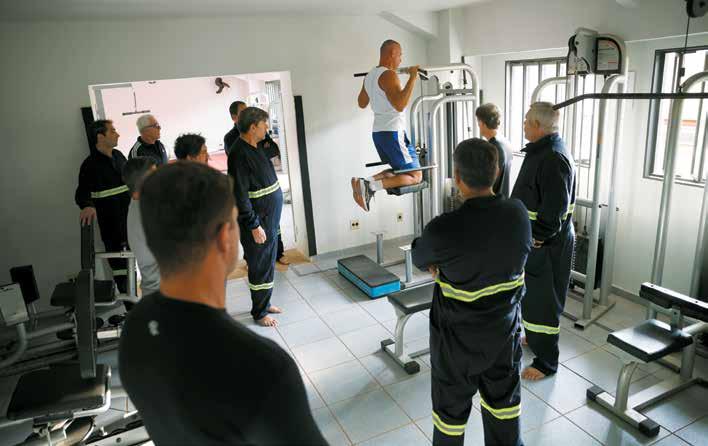
of life jacket – one rigid and the other self-inflatable. The then Brazilian Pilotage vice-president pilot Bruno Fonseca (ZP-05/ Ceará), and technical director pilot Marcio Fausto (ZP-18/São Francisco) participated in the activity with the class.
“It helped give us confidence with the jacket. I have always been anxious about that strap (between the legs for the jacket not to slide upwards) impacting my body in the fall and hindering swimming. That was a myth that crumbled. I really enjoyed the training,” commented pilot Gardel Rodrigues, who preferred to wear the rigid jacket, with which he usually goes onboard, rather than the self-inflatable one.
It was pilot Sergio Velloso’s first ATPR, and he applauded the program:
“I was super-surprised with the structure of the Institute’s facilities and the simulators, as well as the quality of the instructors, knowing how to involve the class, encouraging discussions and exchanges of experiences.”

Pilot João Bosco (ZP-19/Rio Grande) – another volunteer instructor, like pilot Alexandre da Rocha (ZP-21/Itajaí) – told how the ATPR continues to spark interest in pilots from other countries, who have already visited Brazil to share the contents of the program.
“I was at the Latin American Pilots’ Forum in Panama, and a representative from Mexico approached me wanting to send pilots to our ATPR. Not only is our course good, but the Brazilian pilotage system is the same as in other countries that have a maritime culture, and it works.”
Read below the testimonies of the pilots who fell during the ship boarding operation. All stress how important it is to wear a helmet.






I am recording this voice message to contribute to the idea of pilot Marcio Fausto, Conapra’s technical director, to call attention to man-overboard incidents, which occur when the pilot is undertaking a motorboat/ship transfer or vice-versa. I will list some factors that may have contributed to my accident and the lessons learned, if possible.
It was May 2018, the start of my stopover period, first maneuver, ship entry for mooring in Guanabara Bay (Rio de Janeiro). I boarded the pilot boat at 4pm to go to the pilot’s boarding point. It was rainy, and the sea was quite choppy, according to the news. As soon as I started the boat, I called the ship and arranged my boarding, speed and boarding device. My intention was to board as far as possible from Santa Cruz Fort in order to have adequate lee to facilitate the boarding.
In less than 30 minutes the pilot boat was already alongside the ship, and I then got ready to board. As usual, I left the inside of the boat on the opposite side where the ship was, I climbed onto the hoist and sat on the platform, to await the best time for my transfer.
The sea was rough and stormy, and the wind around 20 knots, its direction out of alignment with the sea, which did not allow a suitable situation for an ideal lee. Sitting on the hoist, I was watching the motorboat and ship rising and falling under the effect of the ragged waves. At that moment, the correct decision, but not taken by me, would have been to abort the maneuver. But I didn’t and waited for the best moment to board.
A heavier swell than the others caused the boat to rise higher than usual, and at that moment, I made the transfer. Even today I don’t know why, but suddenly I realized I was falling. I‘d fallen into the motorboat sideways, over the gunwale, on my triceps, shoulder, arm and legs, staring right at the ship’s side.
Next, with nothing to hold on to, I was thrown out of the motorboat, falling between it and the ship. After resurfacing, with the inflated life jacket, I rolled backwards very close to the ship’s hull. Then I realized I was desperate to avoid the propeller area.
It seemed an eternity until I was free of the ship. When I recovered and the adrenaline kicked in, my desire was to return immediately to the motorboat, which was now downwind of my position. So, I began to swim in vain toward the motorboat, which was sailing further and further away from me.
Understanding the problem, and still half stunned, I stopped forcing myself since it was useless. And I asked the master of the motorboat, who still hadn’t taken any action, to maneuver the motorboat, place it windward and then stop the engine. In this situation it was easier to approach the motorboat using my own means and get on board.
I immediately called the ship on the VHF, to stay on course at the same speed since I was still intent on boarding again. At that moment, the seaman on the boat told me that blood was oozing from my shoe. I carefully pulled up my pants and only then I noticed I had been injured. I had a deep cut on my right shin. I called the ship on the VHF again, and after checking its position, I asked the captain to turn around and wait for another pilot outside the bar, since I was injured and could no longer board. The pilot boat then took me to Salvamar Rio and from there I was taken to hospital.
I identified the following factors that I understand contributed to the accident. Obviously, the very rough state of the sea and weather conditions; it was impossible to make the ideal lee for boarding; my wrong decision not to abort the maneuver; and later, trying to find other causes without defining the most important, I found that the sole of my shoe, a sailor’s top sider, was well worn, which could have contributed to my slipping on the Jacob ladder’s step.
I noticed some other relevant points after my accident. On that occasion, in Rio de Janeiro Pilotage we had no information about waves outside the bar. Due to the size of the waves at the time of the accident, the idea of aborting the maneuver could have already been in my mind even before boarding the pilot boat. And, having confirmed the rough sea situation, I could perhaps have decided to abort the maneuver more easily.
It is important to board in a position before the point of no return, so that the ship can maneuver and not enter the shipping channel without the pilot on board in event of an accident like mine. Another key point is that the pilot boat crew must be ready and skilled in situations like that. The crew of my pilot boat at that moment were astonished, standing there frozen in horror, unable to move. The boat’s first aid box did not have all the material to meet my requirements at that time. I searched for scissors to cut my pants open for easy access to the injury but couldn’t find any.
Another aspect worth considering is that the watchtower operators should also be involved in the pilot’s rescue with instructions and inform the pilot boat where to take the pilot. It’s worth remembering that they did not know where to take me after the accident. In Pilotage Zone 15, there are several possibilities, depending on the subzone and point of the subzone where we are maneuvering.
Other information that should be available in the watchtower are specific guidelines previously defined for each pilot. For example: name of the person to inform in case of accident and contact

telephones. Blood type and pre-existing diseases. If there is a doctor accompanying the pilot and any prescribed medication. We must bear in mind that the pilot might be unconscious at the time of rescue.
Also an important question refers to the use of complete PPEs (personal protection equipment). Although the standard does not make a helmet mandatory, its use should be encouraged. On that particular occasion, I was not wearing a helmet and it was a near thing that I did not hit my head when I fell. If I had, it might have been fatal.
The crew should be trained in methods of man-overboard rescue, and efficient devices should be available to them. We must not cut costs with life-saving equipment. Unfortunately, most of us are not aware of this until after an actual incident. This is my report and I hope you find it useful. Good luck to you all.
Rumos Práticos decided not to identify the professional, understanding that what matters here is his contribution to safety.


Good morning. I’m going to tell you about an incident that happened to me when alighting from a Brazilian Navy frigate, on leaving Itajaí (Santa Catarina State). The weather conditions were good, Northeast wind, 10-15 knots, and the sea half a meter to one meter high. The ship was in lee, I climbed onto the ladder, placed my hands on the handrails – which were not on the edge, but inside the gunwale – and placed both my feet on the ladder. I changed the position of my left hand onto the first space I found on the ladder to steady myself. When lifting my right hand I plunged into the water.
At the moment, I couldn’t understand why I’d fallen. The next day, on considering the bruises on my left hand, I concluded that it was a conditioned reflex. Since the frigate stern has a negative slope, the side is not perpendicular to the water line; when I took away my right hand and placed my whole weight on the ladder, the ladder stuck to the side and crushed my left hand.
As I said, the next day my fingertips were bruised. And so I realized what had happened. But at the moment everything happened so quickly. I had no idea how I landed in the water, but it was a conditioned reflex to avoid crushing my hand. And even, my fingertips as well. My body weight on the ladder caused my fingertips on the left hand to be pressed against the side. And although I was wearing gloves they were bruised. I was rescued by the boat that approached by the stern. The lifejacket doesn’t allow mobility, you’re unable to swim, and only float at the most, paddling with your hands. Since the waves were up to a meter high, what made me feel uncomfortable was the situation of the motorboat puffing above me, since it was approaching to pick me up at the stern and then rush alongside the side. I don’t think it’s the best position. It’s better for the motorboat to move to the windward side and cull above the man overboard.
I was wearing an automatic lifejacket that functioned immediately. And after the noise of the motorboat and my situation, with other scratches on my head, I started wearing the helmet after this accident. That’s what I had to tell you. Wishing you all a good course.
Rumos Práticos decided not to identify the professional, understanding that what matters here is his contribution to safety.


Hi, I would like to tell you about an incident of mine when I was doing an entry maneuver into the Vitória Port (Espírito Santo State) some years ago. On that occasion, on the night shift, with a drizzle hindering visibility, I helped with the departure of a Ro-Ro ship. Later I would board another Ro-Ro to return. For various reasons, the incoming ship advanced the pilot’s boarding point and, in order not to compromise safety, I chose the possible lee for boarding, far from the best situation.
On reaching the pilot’s ladder ready on the port side, at the ship’s side door, with the motorboat’s movement I missed the last step. Next, I tried to cling to the ladder, but it was wet, and my gloves didn’t have the necessary grip. I slid down and finally fell into the pilot’s boat in the small space between the handrail and the rubber protection of the side.
It all happened so quickly, since the motor boat didn’t have time to move away after my frustrated attempt to board. Some lessons have been learned. In addition to wearing full PPE (personal protection equipment), including a helmet, life jacket and other accessories, it is essential to make a good lee. I think this is the most important point. We must not disregard having a good lee, because this prevents us from making major boarding risks.
On that occasion, I was wearing a lifejacket with foam insulation and helmet. In my opinion, this also helped protect my ribs and head. As a result of the incident, I only had a slight dislocation in one of the fingers of my left hand. This is what I wanted to tell my colleagues. Wishing you all good maneuvers.
Rumos Práticos decided not to identify the professional, understanding that what matters here is his contribution to safety.


The vice-presidency is now occupied by pilot Marcello Camarinha from Rio de Janeiro
At a general meeting in Brasilia on December 5th, 2023, the Brazilian Pilots’ Association elected vice-president, pilot Bruno Fonseca (ZP-05, Ceará), to head the institution for the two-year period 2024-2025. Former managing director pilot Marcello Camarinha (ZP-15, Rio de Janeiro) took over as vice-president.
Former president, pilot Ricardo Falcão (ZP-01, Fazendinha-AmapáAP/Itacoatiara-Amazon-AM), is now administrative director. Completing the board members are pilots Felipe Perrotta (ZP-12, Bahia) as technical director, and Jelmires Galindo (ZP-18, São Francisco-SC) as financial director.
The elected members of the Audit Committee are Igor Sanderson (ZP-06, Areia Branca-Rio Grande do Norte), Julio Souza (ZP-09, Pernambuco-PE) and Luiz Carlos Amaral (ZP-03, Pará-PA). The substitutes are pilots Gardel Rodrigues (ZP-16, São Paulo-SP), Pedro Parente (ZP-05, Ceará-CE) and Vanessa Zamprogno (ZP-09, Pernambuco-PE).

President Bruno Fonseca, graduate in Nautical Sciences from Admiral Graça Aranha Training Center (Ciaga) of the Brazilian Navy, and post-graduate in Business Management from Getulio Vargas Foundation (FGV), indicates the major challenges for the next two years. He is also chairman of the Brazilian Pilots’ Association Board of Directors in Brasilia:
“After approval of the law that upgrades the pilotage regulations, we will try to make the members of parliament aware of the importance of the country adopting the international conventions addressing accident pollution. Also in Brasilia, we will continue to reinforce our Institute, furthering its integration with the community and intensifying training, such as the ATPR Course. We also need to keep working to make the activity better known in society, since this is a long-term activity. In the technical field, we have to improve the quality of the research reports on boarding devices. After all, it affects our safety. In the environmental area, the focus is to encourage companies to adopt increasingly sustainable practices in their operations, contributing to the world effort to reduce carbon emissions."
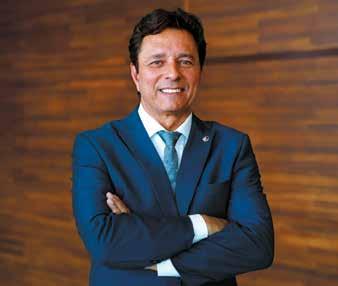

The text gives legal status to the Brazilian Navy’s established standards, and allows Antaq to share in price discussions
On January 16, Law no. 14,813 was published in Brazil’s Official Gazette, which upgraded pilotage regulations. The text, from the Bill 757/2022, was sanctioned on the day before by President Luiz Inácio Lula da Silva. The ceremony was held in the Planalto Palace, in the presence of Silvio Costa Filho, Minister of Ports and Airports, Senator Weverton (PDT party), rapporteur of the bill in the Senate, and pilot Bruno Fonseca, president of Brazilian Pilotage.
The subject, fruit of a ten-year old discussion in Congress, was approved unanimously by the Chamber and Senate, closing a cycle of legal insecurity regarding the activity. The bill amends the Waterway Traffic Safety Act (Bill 9,537/1997) and Law no. 10,233/ 2001, which created the National Waterway Transportation Agency (Antaq).
Safe shipping criteria stated in the Maritime Authority for Pilotage Service Standards (Normam-311/DPC) are now enforced by law. The purpose is to avoid questions on the Brazilian Navy’s discretionary power, as seen in recent years, empowering the Maritime Authority.
One of the safety parameters is the single rota for shipowner services. The scale set by the Navy aims to ensure ongoing availability of the service, prevent pilot fatigue and assure the minimum number of maneuvers to maintain qualification. At the same time, it gives the pilot freedom to always take the safest decision on board, without the business pressure from the shipowner, who does not choose who will uphold it. Similarly, the pilot does not select the shipowner that will attend, thereby preventing any preferential scheme.


Another parameter comprising the text is the mandatory nature of the service for vessels of more than 500 gross tonnage, unless regulated by the Maritime Authority, and those classified solely to operate in inland shipping and with a Brazilian flag, as in the case of barge convoys. The above figure of 500 GT is the definition of a ship in an international convention.
The Navy could grant pilotage exemption to Brazilian captains of ships with a Brazilian flag of up to 100 meters in length, and at least a two-third Brazilian crew. Another criterion for granting concession is the prior requirement of risk analysis attesting to there being no risk to navigation. Today, the Navy now grants the so-called pilotage exemption certificate (PEC) to captains of ships of less than 92 meters.
In economic terms, the price of the service is still freely negotiated between shipowners and pilotage. At the parties’ instigation, whether due to abuse of economic power or a price gap, the Brazilian Navy could set a fixed price on an extraordinary, exceptional and temporary basis. Something new is that the Navy will be able to form a commission to issue a report on the price, consulting Antaq. This was a request from the service providers.
“Our previous president, pilot Ricardo Falcão, did his utmost to inform the parliament member by showing the pilotage systems function in Brazil and the world, and what is the common safety pillar of shipping. Members of parliament and senators in turn had the common sense to study and widely discuss the issue, listening to more than a dozen interested parties. As a result, we have the best regulatory pilotage standard, which reflects the minimum rate of incidents in our waters,” emphasizes Bruno Fonseca, president of Brazilian Pilotage.
The discussion on upgrading the pilotage regulations in the Legislative dragged on for at least ten years and was the subject of widespread technical discussion both in Parliament and the Senate, where 25 sectors were heard by the members of parliament.
The debate of the drafts in Congress was resumed when Bill 877/2022 was sent through the Chamber and approved by 15 votes to zero in the Senate. This bill by Senator Nelsinho Trad (PSD-Mato Grosso do Sul) was submitted in April 2022 and voted in May 2023, after dozens of meetings and public hearings with the stakeholders. Senator Weverton (PDT-MA) was the rapporteur.
In the Chamber, it was decided to use the Senate’s draft and others passing through Parliament, enhancing them in Bill 757/2022 of the Executive, as a substitute. This draft was reported by congressman Coronel Meira (PL-PE) and also approved unanimously after several meetings and public hearings, then submitted to the Senate.
After a request for view by Senator Zequinha Marinho (Podemos party-PA), in order to hear the Navy again, the draft was again analyzed by the Infrastructure Committee, being approved by 12 votes to nil, without needing to go to the plenary, since it was a final draft in a standing committee.
Check out below the new law in full.
PRESIDENT LULA & BRUNO FONSECA, PRESIDENT OF PILOTAGE
Envelope
ID: E4D28DC7-0661-4ED3-BBCA-5FA5796724F4


Matriculado na Junta Comercial do Estado de São Paulo sob o nº 1444
Idioma: Inglês /RG: 11 759 789-2 /CPF: 052 702 558-55 /CCM: 0980935/01
Rua Heitor Chiarello, 747 apt 41 / CEP 14020-520 - Ribeirão Preto - SP
Fone: (016) 98135 8685 – e-mail: penfieldti@gmail com br
Tradução nº: 667 livro: 05 fls 1 de 7
Alters Law nº 9.537, dated December 11, 1997, which establishes the waterway safety traffic on waters under national jurisdiction, to grant legal security and regulatory stability to the pilotage services; and alters Law nº 10.233, dated June 5, 2001, which creates the National Waterway Transportation Agency (Antaq).
I hereby certify, in the capacity of Sworn Translator, that one certified copy of a document written in the Portuguese language was submitted to me on the date shown below, a document which I hereby translate into English to the best of my knowledge and ability Originally entitled – Legislação Informatizada - LEI Nº 14 813, DE 15 DE JANEIRO DE 2024 - Publicação Original
THE PRESIDENT OF THE REPUBLIC
Alters Law nº 9.537, dated December 11, 1997, which establishes the waterway safety traffic on waters under national jurisdiction, to grant legal security and regulatory stability to the pilotage services; and alters Law nº 10.233, dated June 5, 2001, which creates the National Waterway Transportation Agency (Antaq).
I hereby make known that the National Congress decrees, and I sanction, the following Law:
Computerized Legislation - LAW Nº
14.813, DATED JANUARY 15, 2024ORIGINAL PUBLICATION
I hereby make known that the National Congress decrees, and I sanction, the following Law:
DocuSign Envelope ID: E4D28DC7-0661-4ED3-BBCA-5FA5796724F4
Art. 1st This Law alters Law nº 9.537, dated December 11, 1997, which establishes waterway traffic safety on waters under national jurisdiction, to regulate the pilotage service and grant legal security and regulatory stability to the prices of pilotage services, and alters Law nº 10.233, dated June 5, 2001, which creates the National Waterway Transportation Agency (Antaq).
Art. 1st This Law alters Law nº 9.537, dated December 11, 1997, which establishes waterway traffic safety on waters under national jurisdiction, to regulate the pilotage service and grant legal security and regulatory stability to the prices of pilotage services, and alters Law nº 10.233, dated June 5, 2001, which creates the National Waterway Transportation Agency (Antaq).
LAW Nº 14.813, DATED JANUARY 15, 2024
Art. 2nd Law nº 9.537, dated December 11, 1997, shall come into force with the following alterations:
Matriculado na Junta Comercial do Estado de São Paulo sob o nº 1444
Art. 2nd Law nº 9.537, dated December 11, 1997, shall come into force with the following alterations:
Art. 2nd
Art. 2nd
Idioma: Inglês /RG: 11 759 789-2 /CPF: 052 702 558-55 /CCM: 0980935/01
Rua Heitor Chiarello, 747 apt 41 / CEP 14020-520 - Ribeirão Preto - SP
Fone: (016) 98135 8685 – e-mail: penfieldti@gmail com br
Tradução nº: 667 livro: 05 fls 2 de 7 ......
Alters Law nº 9.537, dated December 11, 1997, which establishes the waterway safety traffic on waters under national jurisdiction, to grant legal security and regulatory stability to the pilotage services; and alters Law nº 10.233, dated June 5, 2001, which creates the National Waterway Transportation Agency (Antaq).
THE PRESIDENT OF THE REPUBLIC
I hereby make known that the National Congress decrees, and I sanction, the following Law:
XXII - Pilotage Zone - geographic area demarcated due to local peculiarities that hinder the free and safe movement of vessels, and that require the constitution and permanent availability of pilotage services.
Art. 1st This Law alters Law nº 9.537, dated December 11, 1997, which establishes waterway traffic safety on waters under national jurisdiction, to regulate the pilotage service and grant legal security and regulatory stability to the prices of pilotage services, and alters Law nº 10.233, dated June 5, 2001, which creates the National Waterway Transportation Agency (Antaq).
Art. 12. ..............................................................................................................
§ 1st Pilotage service is an essential activity of a private nature whose objective is to ensure the public's interests in navigation safety, the safeguarding of human life and environmental protection.
Art. 2nd Law nº 9.537, dated December 11, 1997, shall come into force with the following alterations:
Art. 2nd
§ 2nd The pilotage services must be permanently available to provide waterway traffic continuity and efficiency
§ 3rd the State must ensure the adequate and free provision of pilotage services within the terms of this Law.
Art. 12-A. Pilotage services include the pilot, the pilot´s motor boat, and the watchtower
Single Paragraph. Pilots are responsible for the implementation and maintenance of the infrastructure and equipment necessary to perform the pilotage services, the training of collaborators, and the permanent availability of the infrastructure.
Art. 13. The pilotage services shall be performed exclusively by pilots
§ 1 Pilotage service is an essential activity of a private nature whose objective is to ensure the public's interests in navigation safety, the safeguarding of human life and environmental protection.

§ 2nd The pilotage services must be permanently available to provide waterway traffic continuity and efficiency
ID: E4D28DC7-0661-4ED3-BBCA-5FA5796724F4
§ 3rd the State must ensure the adequate and free provision of pilotage services within the terms of this Law

Art. 12-A. Pilotage services include the pilot, the pilot´s motor boat, and the watchtower.
Matriculado na Junta Comercial do Estado de São Paulo sob o nº 1444
Idioma: Inglês /RG: 11 759 789-2 /CPF: 052 702 558-55 /CCM: 0980935/01
Rua Heitor Chiarello, 747 apt 41 / CEP 14020-520 - Ribeirão Preto - SP
Fone: (016) 98135 8685 – e-mail: penfieldti@gmail com br
Tradução nº: 667 livro: 05 fls 1 de 7
Single Paragraph. Pilots are responsible for the implementation and maintenance of the infrastructure and equipment necessary to perform the pilotage services, the training of collaborators, and the permanent availability of the infrastructure.
Art. 13. The pilotage services shall be performed exclusively by pilots properly licensed by the maritime authority
DocuSign Envelope ID: E4D28DC7-0661-4ED3-BBCA-5FA5796724F4
I hereby certify, in the capacity of Sworn Translator, that one certified copy of a document written in the Portuguese language was submitted to me on the date shown below, a document which I hereby translate into English to the best of my knowledge and ability Originally entitled – Legislação Informatizada - LEI Nº 14 813, DE 15 DE JANEIRO DE 2024 - Publicação Original
§ 2nd The maintenance of the pilot´s license shall depend on the following:
Legislation - LAW Nº 14.813, DATED JANUARY 15, 2024ORIGINAL PUBLICATION
I - compliance with the minimum requirements of maneuvers established by the maritime authority;
Matriculado na Junta Comercial do Estado de São Paulo sob o nº 1444
Idioma: Inglês /RG: 11 759 789-2 /CPF: 052 702 558-55 /CCM: 0980935/01
Rua Heitor Chiarello, 747 apt 41 / CEP 14020-520 - Ribeirão Preto - SP
II - attendance in the improvement courses determined by the maritime authority; and
Fone: (016) 98135 8685 – e-mail: penfieldti@gmail com br
Tradução nº: 667 livro: 05 fls 3 de 7
LAW Nº 14.813, DATED JANUARY 15, 2024
III - compliance with the recommendations and determinations coming
from competent international organizations, as long as acknowledged by the maritime authority
§ 3rd It is ensured to every pilot, in the form established in the caput of this article, the free exercise of the pilotage services, respecting the activity s technical and economic regulation within the terms established herein.
Alters Law nº 9.537, dated December 11, 1997, which establishes the waterway safety traffic on waters under national jurisdiction, to grant legal security and regulatory stability to the pilotage services; and alters Law nº 10.233, dated June 5, 2001, which creates the National Waterway Transportation Agency (Antaq).
THE PRESIDENT OF THE REPUBLIC
I hereby make known that the National Congress decrees, and I sanction, the following Law:
Art. 1st This Law alters Law nº 9.537, dated December 11, 1997, which establishes waterway traffic safety on waters under national jurisdiction, to regulate the pilotage service and grant legal security and regulatory stability to the prices of pilotage services, and alters Law nº 10.233, dated June 5, 2001, which creates the National Waterway Transportation Agency (Antaq).
§ 4th The maritime authority may, as long as the requirements established by it in a specific regulation are met, grant exclusively to Brazilian Commanders of vessels flying the Brazilian flag that have no more than 100 m (one hundred meters) in length and whose crew is composed of, at least, 2/3 (two thirds) Brazilians, a Pilotage Exemption Certificate, which shall qualify them to conduct the vessel under their command inside the pilotage zone or part of it, noting that such exemption:
Art. 2nd Law nº 9.537, dated December 11, 1997, shall come into force with the following alterations:
Art. 2nd
I - does not exonerate the service taker from paying the proper compensation to the local pilotage service for the permanent availability of the service, nor the communication to the coordinating watchtower about the intended traffic for vessels with gross tonnage starting at 500 (five hundred), except for the hypotheses established in § 6th of this article;
II - shall be preceded by a risk analysis, which proves that the concession shall not increase the risk to navigation or put in danger the port access canals and their adjacent structures;
III - shall consider the need to comply with previous rest periods for the Commander, to be determined and monitored by the maritime authority; and
IV - shall depend, cumulatively or not, on the Commander´s compliance with:
a) 6 (six) months of previous experience as the Commander of the vessel inside the specific pilotage zone or subzone for the exemption purpose of the concession;
II - shall be preceded by a risk analysis, which proves that the concession shall not increase the risk to navigation or put in danger the port access canals and their adjacent structures;
ID: E4D28DC7-0661-4ED3-BBCA-5FA5796724F4
III - shall consider the need to comply with previous rest periods for the Commander, to be determined and monitored by the maritime authority; and
DocuSign Envelope ID: E4D28DC7-0661-4ED3-BBCA-5FA5796724F4


IV - shall depend, cumulatively or not, on the Commander´s compliance with:
Matriculado na Junta Comercial do Estado de São Paulo sob o nº 1444
Idioma: Inglês /RG: 11 759 789-2 /CPF: 052 702 558-55 /CCM: 0980935/01
Rua Heitor Chiarello, 747 apt 41 / CEP 14020-520 - Ribeirão Preto - SP
a) 6 (six) months of previous experience as the Commander of the vessel inside the specific pilotage zone or subzone for the exemption purpose of the concession;
Matriculado na Junta Comercial do Estado de São Paulo sob o nº 1444
Fone: (016) 98135 8685 – e-mail: penfieldti@gmail com br
Idioma: Inglês /RG: 11 759 789-2 /CPF: 052 702 558-55 /CCM: 0980935/01
Tradução nº: 667 livro: 05 fls 1 de 7
Rua Heitor Chiarello, 747 apt 41 / CEP 14020-520 - Ribeirão Preto - SP Fone: (016) 98135 8685 – e-mail: penfieldti@gmail com br
b) subsequently, 6 (six) months performing pilotage work assisted by the pilot from the respective pilotage zone or its subzone, in a total of no less than 12 (twelve) jobs.
Tradução nº: 667 livro: 05 fls 4 de 7
I hereby certify, in the capacity of Sworn Translator, that one certified copy of a document written in the Portuguese language was submitted to me on the date shown below, a document which I hereby translate into English to the best of my knowledge and ability Originally entitled – Legislação Informatizada - LEI Nº 14 813, DE 15 DE JANEIRO DE 2024 - Publicação Original
§ 5th In each pilotage zone, the professionals shall provide the service according to a single rotation chart ratified by the maritime authority, ensuring the frequency of maneuvers that guarantee the proficiency, equanimous distribution, and permanent availability of the pilotage services.
§ 6th The pilotage services shall be mandatory in all pilotage zones for vessels with gross tonnage over 500 (five hundred), except for:
I - the hypotheses foreseen by the maritime authority in a specific regulation, a situation in which the dismissed vessels must communicate the respective maneuvers to the maritime authority agents; and
LAW Nº 14.813, DATED JANUARY 15, 2024
II - the case of regional vessels, pusher boats, barges, and integrated barge convoys, classified to operate exclusively in inland navigation, regardless of the tonnage, and that hoist the Brazilian flag.
Alters Law nº 9.537, dated December 11, 1997, which establishes the waterway safety traffic on waters under national jurisdiction, to grant legal security and regulatory stability to the pilotage services; and alters Law nº 10.233, dated June 5, 2001, which creates the National Waterway Transportation Agency (Antaq).
Art.
14. ..............................................................................................................
Single Paragraph. To ensure the service is not interrupted or the impossibility of being interrupted, the maritime authority may:
THE PRESIDENT OF THE REPUBLIC
I hereby make known that the National Congress decrees, and I sanction, the following Law:
I - establish the necessary number of pilots for each pilotage zone, according to the specific norm, which must be reviewed periodically to meet the needs of the maritime, fluvial, and lacustrine traffic in the respective zone and the maintenance of the qualification of pilots;
Art. 1st This Law alters Law nº 9.537, dated December 11, 1997, which establishes waterway traffic safety on waters under national jurisdiction, to regulate the pilotage service and grant legal security and regulatory stability to the prices of pilotage services, and alters Law nº 10.233, dated June 5, 2001, which creates the National Waterway Transportation Agency (Antaq).
II - establish, in an exceptional and temporary character, the value of the services in each pilotage zone;
....... (NR)
Art. 2nd Law nº 9.537, dated December 11, 1997, shall come into force with the following alterations:
Art. 15-A. The compensation for the pilotage services includes the operation of the pilot, the pilot´s motorboat, and the watchtower
Art. 2nd
§ 1st In case the rotation of pilots becomes necessary, they shall be lodged within the same conditions as the ship officers, preferably in individual and independent cabins that ensure thermal comfort and effective conditions for their satisfactory rest, and the ship Commander shall be responsible for ensuring the adequacy of the facilities.
DocuSign

Matriculado na Junta Comercial do Estado de São Paulo sob o nº 1444
Idioma: Inglês /RG: 11 759 789-2 /CPF: 052 702 558-55 /CCM: 0980935/01
Rua Heitor Chiarello, 747 apt 41 / CEP 14020-520 - Ribeirão Preto - SP
Fone: (016) 98135 8685 – e-mail: penfieldti@gmail com br
ID: E4D28DC7-0661-4ED3-BBCA-5FA5796724F4
Tradução nº: 667 livro: 05 fls 5 de 7

Matriculado na Junta Comercial do Estado de São Paulo sob o nº 1444
§ 2nd In the ordinary rite, the price of the service shall be freely negotiated between the service takers and providers, restraining any economic abuse practice.
Idioma: Inglês /RG: 11 759 789-2 /CPF: 052 702 558-55 /CCM: 0980935/01
Rua Heitor Chiarello, 747 apt 41 / CEP 14020-520 - Ribeirão Preto - SP
Fone: (016) 98135 8685 – e-mail: penfieldti@gmail com br
Tradução nº: 667 livro: 05 fls 1 de 7
§ 3rd The maritime authority, upon well-based provocation of any of the contracting parties, may determine, in an extraordinary, exceptional, and temporary character, the price for the pilotage services for no more than 12 (twelve) months, extendable for an equal period within the following hypotheses:
I hereby certify, in the capacity of Sworn Translator, that one certified copy of a document written in the Portuguese language was submitted to me on the date shown below, a document which I hereby translate into English to the best of my knowledge and ability Originally entitled – Legislação Informatizada - LEI Nº 14 813, DE 15 DE JANEIRO DE 2024 - Publicação Original
I - for compliance with what is established in subitem II, Single Paragraph, art. 14 of this Law; or
II - whenever the abuse of economic power is proven or if there is a discrepancy in the pilotage services value.
§ 4th The maritime authority shall perform a judgment of admissibility, through a well-based decision, regarding the provocation pertaining to the abuse of economic power by any of the parties or discrepancy of the pilotage services values.
LAW Nº 14.813, DATED JANUARY 15, 2024
§ 5th Once the provocation referred to in § 4th of this article is known, the maritime authority shall form and preside a temporary, joint commission with an advisory character, composed of representatives of the entity providing the pilotage services, the shipowner that hired the pilotage services for the respective zone and the National Waterway Transportation Agency (Antaq), which shall have 45 (forty-five) days to issue an advisory report.
DocuSign Envelope ID: E4D28DC7-0661-4ED3-BBCA-5FA5796724F4
Alters Law nº 9.537, dated December 11, 1997, which establishes the waterway safety traffic on waters under national jurisdiction, to grant legal security and regulatory stability to the pilotage services; and alters Law nº 10.233, dated June 5, 2001, which creates the National Waterway Transportation Agency (Antaq).
THE PRESIDENT OF THE REPUBLIC
§ 6th The economic regulation by the maritime authority shall respect free negotiations and may consider annual monetary correction over the prices customarily practiced in each pilotage zone, the contracts in force, and the time and quality of the service.
I hereby make known that the National Congress decrees, and I sanction, the following Law:
Matriculado na Junta Comercial do Estado de São Paulo sob o nº 1444
Art. 15-B. The instructions on the directions and speeds, in consultation to the vessel Commander, shall be transmitted exclusively by pilots to the Commanders whenever their vessels are navigating in the pilotage zones.
Idioma: Inglês /RG: 11 759 789-2 /CPF: 052 702 558-55 /CCM: 0980935/01
Rua Heitor Chiarello, 747 apt 41 / CEP 14020-520 - Ribeirão Preto - SP
Art. 1st This Law alters Law nº 9.537, dated December 11, 1997, which establishes waterway traffic safety on waters under national jurisdiction, to regulate the pilotage service and grant legal security and regulatory stability to the prices of pilotage services, and alters Law nº 10.233, dated June 5, 2001, which creates the National Waterway Transportation Agency (Antaq).
Fone: (016) 98135 8685 – e-mail: penfieldti@gmail com br
Tradução nº: 667 livro: 05 fls 6 de 7
Art. 15-C. The maritime authority shall determine, according to the periodicity established in a specific norm, the number of pilots necessary
in each pilotage zone, observing the following parameters:
Art. 2nd Law nº 9.537, dated December 11, 1997, shall come into force with the following alterations:
Art. 2nd
I - the number and average duration of the maneuvers in which the pilotage services were used in each pilotage zone, in the 24 (twenty-four) months prior to the determination;
II - the significant and effective alterations that affect the movement of the vessels in the pilotage zone;
III - the need to ensure to the pilots from each pilotage zone the execution of maneuvers without permanent work overload; and
IV - the establishment of the adequate frequency of maneuvers to ensure the maintenance of the uniform proficiency of all pilots in each pilotage zone.
Art. 3rd The caput of art. 27 of Law nº 10.233, dated June 5, 2001, shall henceforth be in force with the addition of subparagraph XXXI:
DocuSign Envelope
I - the number and average duration of the maneuvers in which the pilotage services were used in each pilotage zone, in the 24 (twenty-four) months prior to the determination;
II - the significant and effective alterations that affect the movement of the vessels in the pilotage zone;
ID: E4D28DC7-0661-4ED3-BBCA-5FA5796724F4


III - the need to ensure to the pilots from each pilotage zone the execution of maneuvers without permanent work overload; and
Matriculado na Junta Comercial do Estado de São Paulo sob o nº 1444
IV - the establishment of the adequate frequency of maneuvers to ensure the maintenance of the uniform proficiency of all pilots in each pilotage zone.
Idioma: Inglês /RG: 11 759 789-2 /CPF: 052 702 558-55 /CCM: 0980935/01
Rua Heitor Chiarello, 747 apt 41 / CEP 14020-520 - Ribeirão Preto - SP
Art. 3rd The caput of art. 27 of Law nº 10.233, dated June 5, 2001, shall henceforth be in force with the addition of subparagraph XXXI:
Fone: (016) 98135 8685 – e-mail: penfieldti@gmail com br
Tradução nº: 667 livro: 05 fls 1 de 7
Art.
I hereby certify, in the capacity of Sworn Translator, that one certified copy of a document written in the Portuguese language was submitted to me on the date shown below, a document which I hereby translate into English to the best of my knowledge and ability Originally entitled – Legislação Informatizada - LEI Nº 14 813, DE 15 DE JANEIRO DE 2024 - Publicação Original
27. ..............................................................................................................
XXXI - participate in the commission referred to in § 5th, art. 15-A of Law nº 9.537, dated December 11, 1997.
........ (NR)
Art. 4th § 2nd and art. 24 of Law nº 9.537, dated December 11, 1997, are hereby revoked.
DocuSign Envelope ID: E4D28DC7-0661-4ED3-BBCA-5FA5796724F4
Art. 5th This Law shall come into force on the date of its publication.
LAW Nº 14.813, DATED JANUARY 15, 2024
Brasília, January 15, 2024.
Matriculado na Junta Comercial do Estado de São Paulo sob o nº 1444
Silvio Serafim Costa Filho
Idioma: Inglês /RG: 11 759 789-2 /CPF: 052 702 558-55 /CCM: 0980935/01
Alters Law nº 9.537, dated December 11, 1997, which establishes the waterway safety traffic on waters under national jurisdiction, to grant legal security and regulatory stability to the pilotage services; and alters Law nº 10.233, dated June 5, 2001, which creates the National Waterway Transportation Agency (Antaq).
Rua Heitor Chiarello, 747 apt. 41 / CEP 14020-520 - Ribeirão Preto - SP
Fone: (016) 98135.8685 – e-mail: penfieldti@gmail.com.br
This text does not substitute the original text published in the Official Union Gazette - Section 1 dated 01/16/2024
Tradução nº: 667 livro: 05 fls 7 de 7
THE PRESIDENT OF THE REPUBLIC
Publication:
I hereby make known that the National Congress decrees, and I sanction, the following Law:
● Official Union Gazette - Section 1 - 01/16/2024, Page 1 (Original Publication)
Art. 1st This Law alters Law nº 9.537, dated December 11, 1997, which establishes waterway traffic safety on waters under national jurisdiction, to regulate the pilotage service and grant legal security and regulatory stability to the prices of pilotage services, and alters Law nº 10.233, dated June 5, 2001, which creates the National Waterway Transportation Agency (Antaq).
I vouch and certify that the above transcript is a true and faithful translation of the original document presented to me.
Fees: R$ 1 226,13
Rec. nº 732
Ribeirão Preto, February 22, 2024
Art. 2nd Law nº 9.537, dated December 11, 1997, shall come into force with the following alterations:
Art. 2nd
Michael Bradford Penfield

The National Pilotage Council auctioned one of the artworks by Bruno Big on the pilot activity in benefit of the humanitarian organization Doctors Without Borders (MSF). The online auction began on November 21 and ended on December 6 during the International Seminar of the 45th National Pilotage Meeting in Brasilia. Pilot Diogo Weberszpil from Rio de Janeiro procured the artwork on behalf of the institution.
For more than 50 years, Doctors Without Borders has brought health care to people impacted by warfare, natural and socio-

environmental disasters, epidemics, malnutrition or with no access to medical care. The international humanitarian organization helps meet the requirements of vulnerable populations without discrimination of race, religion or political convictions; and regardless of economic and political powers.
The non-profit, non-governmental organization is funded almost exclusively by donations from individuals worldwide. More than 97% of the funds raised in 2022 was obtained from individual persons and the private corporate sector. This support is essential for its continued independence and autonomy when undertaking the projects.
According to Leanne Neale, director of MSF Fundraising-Brazil, with the funds raised by the auction they can procure 34,056 therapeutic food sachets for 537 malnourished children for a month.
“It is a huge contribution. I do hope we can form new partnerships.”
The funds were transferred directly to the institution. To give transparency to the process, the pilotage chose the eSolidar platform, responsible for solidarity auctions of brands well-known in the market. The sum was its website record.
The auctioned painting, 120 centimeters in height and 90 centimeters in width, portrays a pilot boarding a ship, a moment of risk for the profession. The author, Bruno Carneiro Mosciaro, better known as Bruno Big, developed his own language and style, assuring his recognition at home and abroad. Learn more about his artwork at brunobig.com.
Also please collaborate with the institution Doctors Without Borders: doe.msf.org.br

After having restricted printing to its Portuguese version, after the next edition Rumos Práticos will only be printed for distribution at events and for anyone who expresses interest in having the printed version at: praticagemdobrasil.org.br/revista-rumos/assinantes. Answers by March 31, 2024.
The paper industry procures pulp from planted forests, but there are environmental controversies regarding monoculture. Moreover, the industry is one of the largest consumers of water, fossil fuels and electricity, generating liquid effluents, air emissions and solid waste.
In order to reduce impacts, the paper used by Rumos Práticos comes from responsible forest management, certified by the Forest Stewardship Council (FSC).
Our online edition is available in: praticagemdobrasil.org.br/ revista-rumos.


Pilot Bruno Fonseca, vice-president of Brazilian Pilotage, Arionor Souza, its executive secretary, and Jacqueline Wendpap, executive director of the Brazilian Pilotage Institute participated in November in the technical delegation to Southeast Asia, as part of the Brazil Export – National Forum of Logistics, Infrastructure and Transportation. The president of São Paulo Pilots, Fabio Mello Fontes, was also a member of the committee. The program included visits to the Singapore Port Authority, companies in the sector and Tanjung Pelepas Port in Malaysia. More than 80 business executives and authorities were members of the delegation, including Mariana Pescatori, national secretary for Ports and Waterway Transportation, and Flavia Takafashi, director of the National Agency for Waterway Transportation (Antaq).

Pilot Gustavo Martins, president of the National Pilots’ Federation, mediated a session of the event for the National Infrastructure and Logistics Efficiency Pact ( Painel 2023 - Portuguese abbreviation ), in Brasilia. The topic was “Investments in Port Infrastructure and Impact on Integrated Logistics”. Participants in the debate were Eduardo Nery, director-general of the National Agency for Waterway Transportation (Antaq); Osmari de Castilho, administrative director-superintendent of Portonave; and Pedro Barros, researcher of the Applied Economic Research Institute (IPEA). The event was hosted by the BESC Institute of Humanities and Economics. “The port is the focus point where sea or river freight is transferred to land or air modes. The efficiency in the port is key to the smooth running of the system”, emphasized Gustavo.
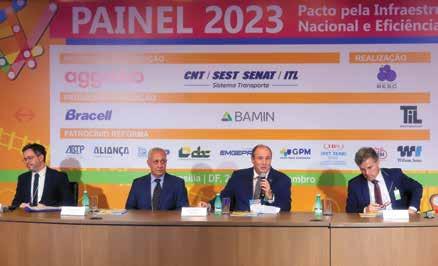

Maria Cristina Figueiredo and Romena De Aragón. First round trip in the Amazon completed by two women, taking turns as pilots on the bridge. A 420-nautical mile stretch from Fazendinha (Amapá-AP) to Trombetas Port (Pará-PA). The Eastern Amazon Basin involves the largest pilotage zone in Brazil and does not always coincide with the same pilots on board together. After all, there are 154 qualified pilots in the ZP. Maria Cristina qualified in December 2016 and Romena in April 2015, but it was only in January 2024 that they did a round trip together. In 2019, they left together from Fazendinha, but were relieved by colleagues in Santarem (PA).


Eliane Blanch assumes a new role in the International Association of Maritime Pilots (IMPA), as director of Sustainability and Relations. Since 2018 in IMPA, she will be head of support for members on issues relating to sustainable practices in the industry and social responsibility, attending the meetings of the International Maritime Organization (IMO) on this matter. Moreover, she will support president Simon Pelletier and Matthew Williams, generalsecretary, in the work on engaging with IMO and international organizations. Brazilian Pilotage wishes the director every success.
The percentage of irregularities in ship boarding and disembarking is still over 16%, and more than 50% of these irregularities are found in Jacob’s ladders. This was the result of the annual safety study with pilots, performed in 2023 by the International Maritime Pilots’ Association (IMPA). The agency completes the revision of the poster on the correct installation of the devices, fixed to the bridge of vessels, and drafts a guide on how to proceed during operations. This work will supplement the revision of the standards regulating the layouts. IMPA participates in this process in the International Maritime Organization (IMO). The changes, however, will only be enforced in 2028, requiring the utmost effort in inspecting the problems and making those involved aware.
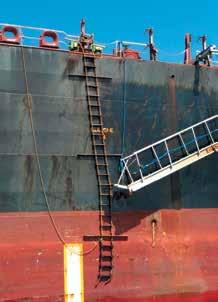
The video of the ladder falling 20 minutes after pilot Guido Cajaty’s ascent in Rio Grande (Rio Grande do Sul-RS), was the audience highlight on social media, calling attention to a recurring problem in shipping. Pilot Cajaty recorded it from the bridge and had more than 70,000 views on Instagram, Facebook, YouTube and Twitter. Fortunately, Guido Cajaty had already boarded and safely crossed the Rio Grande bar. The incident occurred on October 14.
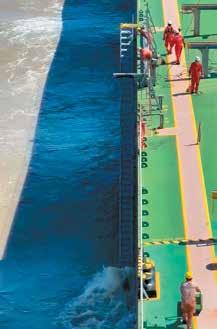
We visited Panama in September during the Latin American Pilots’ Forum, an event that the Brazilian pilots helped found. We took the opportunity to film for our viewers the entrance to the new Panama Canal and the maneuver training center with small-scale ships. Brazilian pilots were the first foreigners to train on the site in 2018. Both videos were viewed by more than 14,000 followers on our networks.


The pilotage video lesson, recorded by former president Ricardo Falcão, has already been attended by 10,000 people. He explains in simple language for 36 minutes everything involving the pilot’s job. The recording was made in the Naval Museum in Rio de Janeiro. During the class, slides, images and illustrative videos of the activity were shown. The material is found in the Playlists of the YouTube section, both in the complete version and in shorter thematic blocks.



The 55th edition of the international pilots' magazine is now available, published by the International Maritime Pilots’ Association (IMPA).
The magazine highlights the work of Kitack Lim, secretarygeneral of the International Maritime Organization (IMO) on behalf of the pilots, and discusses the results of the latest IMPA study on boarding and disembarking devices, a topic of pilot concern.
The publication also summarizes international pilotage events, in addition to articles on the socio-environment. And is innovative in spreading information about activities of institutions that aid the maritime sector. The first feature addressed the support of the International Seafarers’ Welfare and Assistance Network (Iswan), a UK-based organization.
Consult praticagem.link/imparevista
Issue 55 / January 2024
